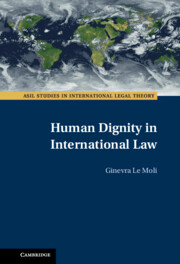Book contents
- Human Dignity in International Law
- ASIL Studies in International Legal Theory
- Human Dignity in International Law
- Copyright page
- Dedication
- Contents
- Figures
- Acknowledgements
- Table of Instruments
- Table of Cases
- Abbreviations
- Introduction
- 1 Analytical Framework
- 2 Two Circles of Dignity
- 3 Three Constitutive Stages
- 4 Human Dignity in International Humanitarian Law
- 5 Human Dignity in Human Rights Law
- 6 Human Dignity in International Criminal Law
- 7 Bridging Narratives
- Select Bibliography
- Index
5 - Human Dignity in Human Rights Law
Published online by Cambridge University Press: 12 May 2022
- Human Dignity in International Law
- ASIL Studies in International Legal Theory
- Human Dignity in International Law
- Copyright page
- Dedication
- Contents
- Figures
- Acknowledgements
- Table of Instruments
- Table of Cases
- Abbreviations
- Introduction
- 1 Analytical Framework
- 2 Two Circles of Dignity
- 3 Three Constitutive Stages
- 4 Human Dignity in International Humanitarian Law
- 5 Human Dignity in Human Rights Law
- 6 Human Dignity in International Criminal Law
- 7 Bridging Narratives
- Select Bibliography
- Index
Summary
Chapter Five charts human dignity in its second constitutive stage, characterized by the rise of international human rights law. Its first expressions in the 1920s (which echoed developments in connection with slave trade and slavery in the nineteenth century) and later in 1944 (with the Philadelphia Declaration), must be considered in the light of the decisive adoption of the Universal Declaration on Human Rights, in 1948, and the adoption of the Convention against Genocide later that year. But it is difficult to consider these entry points, however important, as sufficient for the consolidation of human dignity in the form of human ‘rights’. In earnest, the consolidation process was not completed until the adoption of the two human rights Covenants in 1966, the International Covenant on Civil and Political Rights (ICCPR) and International Covenant on Economic, Social and Cultural Rights (ICESCR).
Keywords
- Type
- Chapter
- Information
- Human Dignity in International Law , pp. 216 - 268Publisher: Cambridge University PressPrint publication year: 2021



